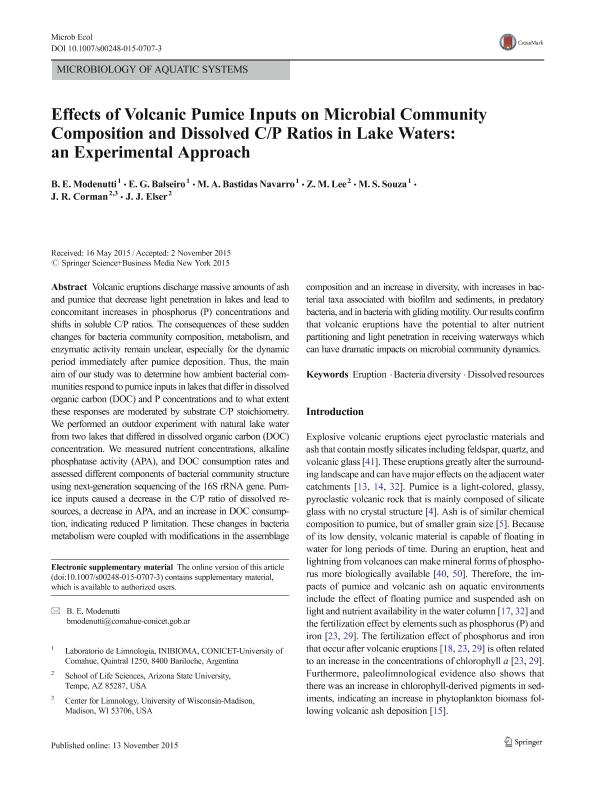Mostrar el registro sencillo del ítem
dc.contributor.author
Modenutti, Beatriz Estela

dc.contributor.author
Balseiro, Esteban Gabriel

dc.contributor.author
Bastidas Navarro, Marcela Alejandra

dc.contributor.author
Lee, Z. M.
dc.contributor.author
Souza, María Sol

dc.contributor.author
Corman, J. R.
dc.contributor.author
Elser, J. J.
dc.date.available
2017-01-27T21:32:21Z
dc.date.issued
2016-01
dc.identifier.citation
Modenutti, Beatriz Estela; Balseiro, Esteban Gabriel; Bastidas Navarro, Marcela Alejandra; Lee, Z. M.; Souza, María Sol; et al.; Effects of volcanic pumice inputs on microbial community composition and dissolved C/P ratios in lake waters: an experimental approach; Springer; Microbial Ecology; 71; 1; 1-2016; 18–28
dc.identifier.issn
0095-3628
dc.identifier.uri
http://hdl.handle.net/11336/12149
dc.description.abstract
Volcanic eruptions discharge massive amounts of ash and pumice that decrease light penetration in lakes and lead to concomitant increases in phosphorus (P) concentrations and shifts in soluble C/P ratios. The consequences of these sudden changes for bacteria community composition, metabolism, and enzymatic activity remain unclear, especially for the dynamic period immediately after pumice deposition. Thus, the main aim of our study was to determine how ambient bacterial communities respond to pumice inputs in lakes that differ in dissolved organic carbon (DOC) and P concentrations and to what extent these responses are moderated by substrate C/P stoichiometry. We performed an outdoor experiment with natural lake water from two lakes that differed in dissolved organic carbon (DOC) concentration. We measured nutrient concentrations, alkaline phosphatase activity (APA), and DOC consumption rates and assessed different components of bacterial community structure using next-generation sequencing of the 16S rRNA gene. Pumice inputs caused a decrease in the C/P ratio of dissolved resources, a decrease in APA, and an increase in DOC consumption, indicating reduced P limitation. These changes in bacteria metabolism were coupled with modifications in the assemblage composition and an increase in diversity, with increases in bacterial taxa associated with biofilm and sediments, in predatory bacteria, and in bacteria with gliding motility. Our results confirm that volcanic eruptions have the potential to alter nutrient partitioning and light penetration in receiving waterways which can have dramatic impacts on microbial community dynamics.
dc.format
application/pdf
dc.language.iso
eng
dc.publisher
Springer

dc.rights
info:eu-repo/semantics/openAccess
dc.rights.uri
https://creativecommons.org/licenses/by-nc-sa/2.5/ar/
dc.subject
Bacteria Diversity
dc.subject
Eruption
dc.subject
Phosphatase Enzyme
dc.subject
Disolved Resources
dc.subject.classification
Biología Marina, Limnología

dc.subject.classification
Ciencias Biológicas

dc.subject.classification
CIENCIAS NATURALES Y EXACTAS

dc.title
Effects of volcanic pumice inputs on microbial community composition and dissolved C/P ratios in lake waters: an experimental approach
dc.type
info:eu-repo/semantics/article
dc.type
info:ar-repo/semantics/artículo
dc.type
info:eu-repo/semantics/publishedVersion
dc.date.updated
2016-12-12T14:23:12Z
dc.identifier.eissn
1432-184X
dc.journal.volume
71
dc.journal.number
1
dc.journal.pagination
18–28
dc.journal.pais
Estados Unidos

dc.journal.ciudad
Nueva York
dc.description.fil
Fil: Modenutti, Beatriz Estela. Universidad Nacional del Comahue. Centro Regional Universitario Bariloche. Laboratorio de Limnologia; Argentina. Consejo Nacional de Investigaciones Científicas y Técnicas. Centro Científico Tecnológico Patagonia Norte. Instituto de Investigación en Biodiversidad y Medioambiente; Argentina
dc.description.fil
Fil: Balseiro, Esteban Gabriel. Universidad Nacional del Comahue. Centro Regional Universitario Bariloche. Laboratorio de Limnologia; Argentina. Consejo Nacional de Investigaciones Científicas y Técnicas. Centro Científico Tecnológico Patagonia Norte. Instituto de Investigación en Biodiversidad y Medioambiente; Argentina
dc.description.fil
Fil: Bastidas Navarro, Marcela Alejandra. Universidad Nacional del Comahue. Centro Regional Universitario Bariloche. Laboratorio de Limnologia; Argentina. Consejo Nacional de Investigaciones Científicas y Técnicas. Centro Científico Tecnológico Patagonia Norte. Instituto de Investigación en Biodiversidad y Medioambiente; Argentina
dc.description.fil
Fil: Lee, Z. M.. Arizona State University; Estados Unidos
dc.description.fil
Fil: Souza, María Sol. Universidad Nacional del Comahue. Centro Regional Universitario Bariloche. Laboratorio de Limnologia; Argentina. Consejo Nacional de Investigaciones Científicas y Técnicas. Centro Científico Tecnológico Patagonia Norte. Instituto de Investigación en Biodiversidad y Medioambiente; Argentina
dc.description.fil
Fil: Corman, J. R.. Arizona State University; Estados Unidos
dc.description.fil
Fil: Elser, J. J.. Arizona State University; Estados Unidos. University Of Wisconsin; Estados Unidos
dc.journal.title
Microbial Ecology

dc.relation.alternativeid
info:eu-repo/semantics/altIdentifier/doi/http://dx.doi.org/10.1007/s00248-015-0707-3
dc.relation.alternativeid
info:eu-repo/semantics/altIdentifier/url/http://link.springer.com/article/10.1007%2Fs00248-015-0707-3
Archivos asociados
